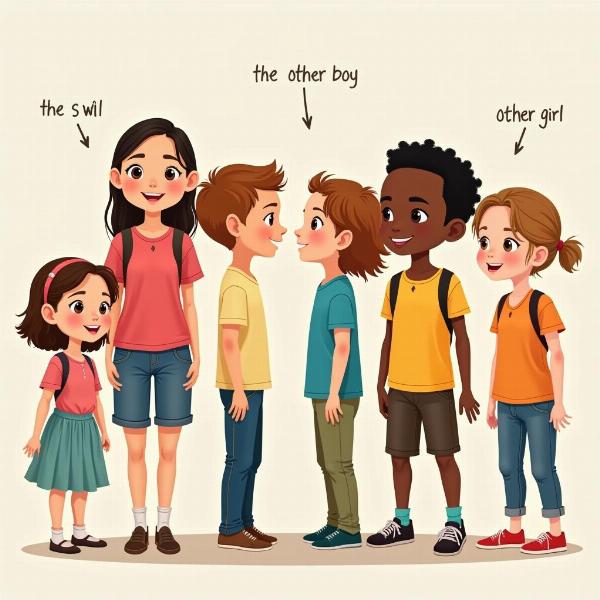Understanding the nuances of “other one” in Hindi can be tricky, as direct translations often miss the mark. It’s not just about finding the right word, but also understanding the cultural context and the specific situation. This article will delve into the various ways to express “other one” in Hindi, providing you with a comprehensive understanding of its diverse meanings and applications. “Other one” meaning in Hindi depends largely on what “one” refers to – is it a person, object, place, or concept?
Deciphering “Other One”: Context is Key
The most appropriate Hindi translation for “other one” depends heavily on the context. Is it referring to a person, an object, a place, or even an abstract concept? This crucial piece of information determines the word choice. Let’s explore some common scenarios and the corresponding Hindi translations.
Referring to People
When “other one” refers to a person, several options exist, each with its own subtle meaning:
- दूसरा (dusra/dusri): This is the most common and general translation for “other.” Use dusra for masculine nouns and dusri for feminine nouns. For example, “the other boy” would be “दूसरा लड़का (dusra ladka)” and “the other girl” would be “दूसरी लड़की (dusri ladki).”
- और एक (aur ek): Literally translating to “one more,” this phrase is suitable when referring to an additional person within a group. For instance, “We need one other person” could be translated as “हमें और एक व्यक्ति चाहिए (hamein aur ek vyakti chahie).”
- अन्य (anya): This term implies “different” or “another” and is more formal than dusra. It’s suitable for situations requiring a more sophisticated tone.
 The Other Boy and The Other Girl
The Other Boy and The Other Girl
Referring to Objects
When “other one” refers to an object, similar principles apply:
- दूसरा (dusra/dusri): This remains a versatile option. “The other book” translates to “दूसरी किताब (dusri kitaab).”
- वह वाला (vah wala/vali): This phrase, meaning “that one,” is useful when pointing to a specific object.
- और एक (aur ek): Just as with people, this phrase works when talking about an additional object.
Referring to Places and Concepts
For places and concepts, “other one” translates differently:
- दूसरी जगह (dusri jagah): This means “other place.”
- अन्य विकल्प (anya vikalp): This translates to “other option” and is suitable for abstract concepts.
- दूसरा तरीका (dusra tarika): Meaning “other way” or “other method,” this phrase is used when discussing alternatives.
“Other One” in Everyday Conversations
Understanding how “other one” is used in casual conversation is essential for effective communication. Imagine you’re at a market in India. You might hear phrases like:
- “मुझे दूसरा वाला चाहिए (mujhe dusra wala chahie)” – “I want the other one.” (pointing to a specific item)
- “क्या आपके पास और एक है? (kya aapke paas aur ek hai?)” – “Do you have another one?”
These practical examples highlight the importance of context and choosing the correct Hindi translation.
Conclusion: Mastering “Other One” in Hindi
“Other one” meaning in hindi can be expressed in various ways, depending on the context and the noun it modifies. Whether you use dusra, aur ek, anya, or another phrase, understanding the nuances of each term will help you communicate accurately and effectively in Hindi. By considering the specific situation and the type of “one” being referenced, you can choose the most appropriate translation and avoid any miscommunication. Remember, context is king when navigating the rich tapestry of the Hindi language.
FAQs
- What is the most common way to say “other one” in Hindi? The most common translation is dusra (masculine) or dusri (feminine).
- When should I use aur ek? Use aur ek when referring to “one more” of something.
- Is there a formal way to say “other one”? Yes, anya is a more formal option.
- How do I say “other place” in Hindi? “Other place” is translated as dusri jagah.
- What if “other one” refers to an abstract concept? Consider using phrases like anya vikalp (other option).
- Why is context important when translating “other one”? Context dictates the appropriate Hindi word choice to avoid misinterpretation.
- Where can I learn more about Hindi translations? Meaning-Hindi.in offers expert translation services for various needs, from business documents to educational materials.
Related Articles
Meaning-Hindi.in is your premier destination for professional Hindi translation services. We specialize in accurate and culturally sensitive translations for a wide range of content, including business and legal documents, technical manuals, website localization, and educational materials. Our expert linguists ensure your message resonates effectively with your target audience. Contact us today for a free quote! Email: [email protected], Phone: +91 11-4502-7584. Let Meaning-Hindi.in bridge the language gap for you!